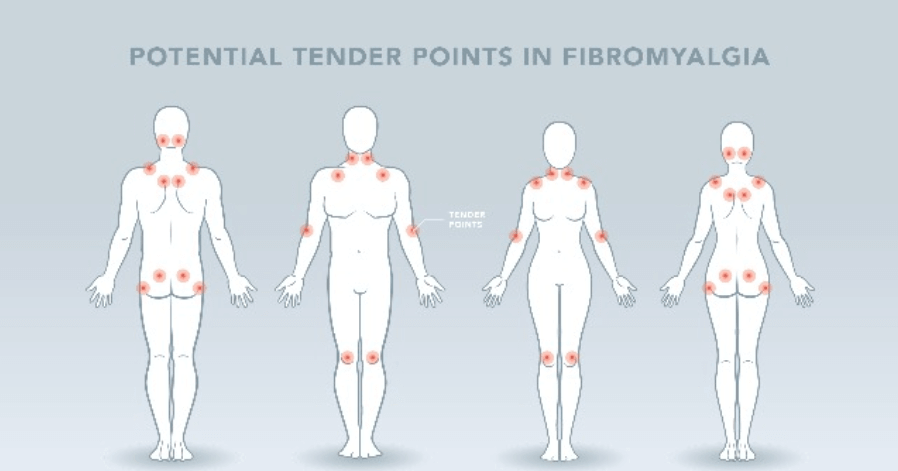Fibromyalgia & Anxiety: A Painful Connection

As we pick up the pieces of the aftermath of COVID-19, the world’s mental health may take a while to catch up. Depression and anxiety cases have skyrocketed in 2021 to an average of 41.1% of adults, according to the U.S Census Bureau Pulse Survey. The tough risk factors of these mood disorders are their physical manifestations through conditions like fibromyalgia.
As a non-surgical pain management practice in Charlotte, Advanced Sports & Spine aims to educate our patients on how our bodies pick up what troubles the mind through physical pain like headaches, fatigue, and conditions like fibromyalgia. We hope that through this post, patients will reach out to a healthcare professional and manage mental distress before their physical health suffers the consequences.
What is fibromyalgia?
Fibromyalgia is a condition where your body feels overall pain and tenderness in the soft tissues and muscles (widespread pain) without any injury or illness. It happens due to the abnormal pain perception processing of the body wherein people with fibromyalgia are more sensitive to pain, especially on some tender points. They get more pain signals from the nerves to the central nervous system than the ones that help slow down or reduce the pain signals.

Some medical experts believe that fibromyalgia is caused by a glitch in how the brain and spinal cord process the pain signals. So, the diagnosis of fibromyalgia goes beyond chronic pain and fatigue. Several factors may change the normal processing of pain signals including genes, medical conditions like rheumatoid arthritis, mental and emotional conditions, and abuse.
Fibromyalgia is a lifelong condition, and as of today, there’s still no cure for it. The good thing is there are several treatments and complementary therapies that can help manage chronic pain and improve the quality of life of patients with fibromyalgia. These include targeting the possible causes through cognitive-behavioral therapy (CBT), exercises, and interventional pain treatments,
Fibromyalgia symptoms
Fibromyalgia is a complex condition that may manifest in several parts of the body. It can take some time to get a diagnosis with the right series of tests with a pain specialist and other experts knowledgeable of this condition. Here are the widespread symptoms of fibromyalgia:
- Pain and stiffness that spread all over the body for more than 3 months with pain on the 11 to 18 designated tender points like chronic low back pain
- Fatigue and restlessness
- Tension headaches and migraines
- Tingling sensation or numbness in hands and feet
- Pain in the jaw or facial area (e.g., Temporomandibular Joint Syndrome or TMJ)
- Digestive conditions (abdominal pain, bloating, constipation, and irritable bowel syndrome or IBS)
- Depression and anxiety
- Sleep issues
- Issues with thinking, memory, and concentration

Fibromyalgia and anxiety: How are they connected?
Extreme or prolonged emotional distress and trauma can change how our brain processes stress and pain which can lead to anxiety and fibromyalgia. According to research conducted by McGill Researchers, patients exposed to prolonged psychological stress and abuse have a 40% decrease in brain receptors that helps decrease the amount of cortisol or stress hormones in the brain.
The abundance of cortisol in the brain in patients with anxiety and depression can be damaging and cause an alteration in its physical and chemical structure. If left untreated, patients with anxiety may experience worse anxiety symptoms like panic attacks or panic disorders, or worse, fibromyalgia. Other than fibromyalgia, it may also cause stress-related medical conditions like heart disease and mental illnesses.
What does fibromyalgia pain feel like?
Most patients with fibromyalgia describe the pain as a continuous or chronic pain that travels around the body. Each of them experiences different kinds of pain, such as:
- Muscle strain you feel when lifting a heavy object
- Aching joints
- Frequent headaches
- Sore and overworked muscles
- Stabbing pain
- Some extreme conditions like debilitating overall pain
- Burning sensations in tender points

Possible causes of fibromyalgia
Medical experts and doctors are looking at various possible causes of fibromyalgia. Most of them are often related to some brain-changing activities that impact the pain receptors in our brain. Other than mood disorders, like anxiety and depression, the other possible causes include:
- Sedentary lifestyle
- Post-traumatic disorder (PTSD)
- Genes
- Emotional and physical abuse
- Staying in a highly stressful environment
Treatments for fibromyalgia
Since fibromyalgia is a complex medical condition, its symptoms can be easily misdiagnosed into another disease or condition. However, through comprehensive tests and thorough analysis, your pain doctor can help you diagnose and manage fibromyalgia. The comprehensive treatments for fibromyalgia are as follows:
- Physical and occupational therapy
- Medications, antidepressants, and selective serotonin reuptake inhibitor (SSRI)
- Lifestyle changes like complete sleep and exercise
- Relaxation techniques – breathing exercises, meditation, and massage
- Cognitive-behavioral therapy (CBT)
- Stress management techniques such as meditation, yoga, and massage
- Interventional pain treatments
Interventional treatments for fibromyalgia pain relief
When patients have undergone several treatments for fibromyalgia and managed to control the pain in certain areas of the body, they can consider interventional treatments.
Fibromyalgia is a complex condition with widespread pain, so interventional pain treatments can work best for patients if the pain points are segregated in certain areas. Your doctor may recommend the following options to help reduce your pain:
Trigger point injections
Trigger point injections are done to relieve muscle pain in certain areas of your body, particularly your trigger points. Trigger points are where you experience muscle spasms and muscle knots. It is an outpatient procedure and is done within several minutes.
Botox
While Botox is a common cosmetic procedure, it also plays a vital role in treating muscle pain. It helps local muscle relaxation and helps inhibit the pain signals to the brain.
Let us help you manage your pain at Advanced Sports & Spine
Due to the complexity of fibromyalgia, it’s crucial to consult a pain specialist that knows it well. Dr. Ahmad can help you figure out several pain management techniques to manage your condition. Schedule an appointment today and regain your life back with the help of our medical team.
